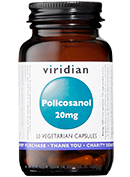
Viridian Policosanol 20mg
What is Policosanol?
Policosanol is the term for a mixture of long chain alcohols isolated and purified from rice bran.
This naturally nutritious supplement is well-suited to those seeking to lower the risks associated with a high-fat and low-exercise lifestyle.
A single vegan capsule delivers 20mg of Policosanol and contains 60% naturally occurring Octacosanol.
Contains 100% active ingredients formulated by expert nutritionists with no artificial fillers and no nasties. Sourced according to Viridian’s strict ethical criteria including no animal testing, GMO or palm oil.
